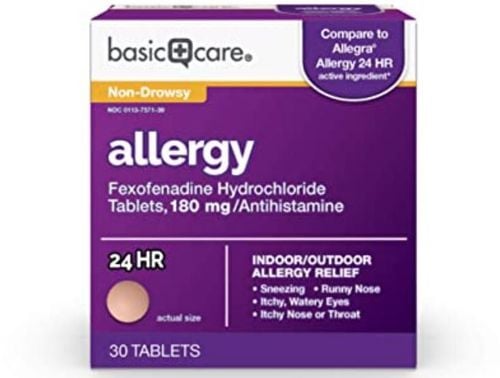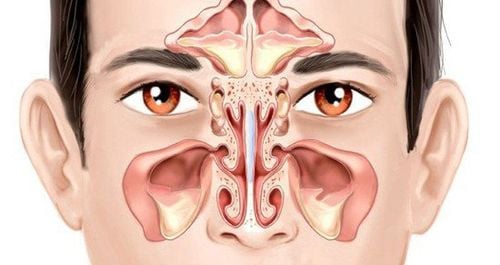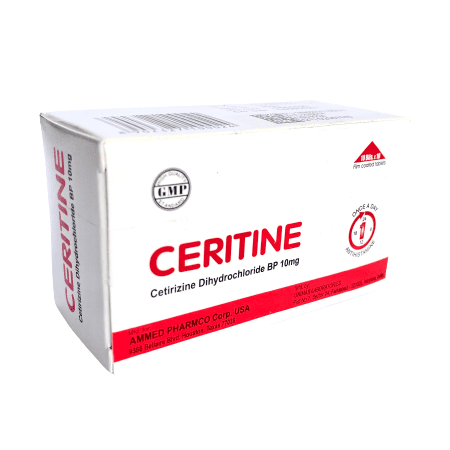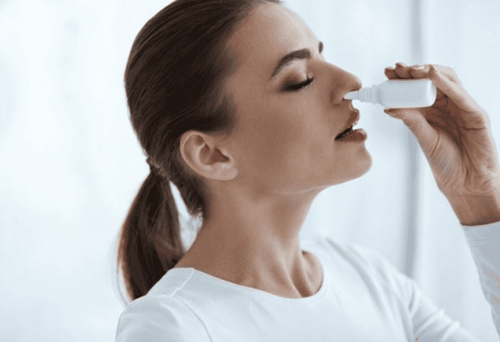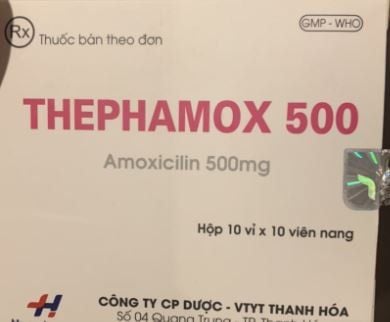This is an automatically translated article.
Runny nose, watery eyes at home can be caused by colder temperatures outside, or by colds, flu or allergies. Treat by drinking plenty of fluids, especially water, and getting as much rest as possible. You can ease symptoms by spraying physiological saline and placing a mist humidifier near your bed to combat nasal congestion aggravated by cold, dry air. However, can surgery and other watery nose treatments help minimize this? Check out the article below for more details.
1. What is watery eyes, runny nose?
Runny nose, also known as runny nose. A runny nose is a condition in which mucus flows from the nostrils out of the nose. This phenomenon occurs because the mucus in the nose is produced more than usual. This fluid can drain out of the nostrils or into the oral cavity.
The common cold or flu is a common cause of a runny nose, but sometimes allergies can also cause problems. However, a runny nose is not the only symptom of a cold or flu, other symptoms may accompany it, such as sneezing, coughing, chest tightness, sore throat, headache, and body aches.
The nose is the starting point of the breathing process. After the air passes through the nose, the air enters the lungs. The air that passes through the nose is filtered, humidified, warmed or cooled so that a stream of clean air can enter the lungs.
A special mucous layer, or a moist tissue, covers the area inside your nose and contains many mucus-producing glands. When bacteria, allergens, dust, or other harmful particles enter the nose, mucus traps them.
In addition, mucus also contains antibodies, or enzymes, that kill unwanted bacteria and viruses. Furthermore, the mucosal layer also has cilia. The cilia are constantly in motion and move harmful particles that are collected and possibly the mucus they get trapped through the nose into the oral cavity. If we swallow it in the stomach, the above parts will be destroyed by the stomach acid. If we push these substances out of the oral cavity, please ensure hygiene by putting them in a separate bag/box before putting them in the trash.
When the outdoor temperature turns to cold winter, the rate of the runny nose process is slowed down. Many times the mucus collects in the nose and then drips or drains out. Mucus is an important ingredient for keeping your airways moist and functioning properly. Mucus not only prevents harmful particles from entering the lungs, but also contains antibodies that help destroy bacteria. However, having too much of this mucus in the nose will lead to a runny nose.
A runny nose can be caused by one or more of the following:
Allergies. Cold temperature. Common cold. Colds and flu Purulent rhinitis, a form of non-allergic rhinitis that causes a runny nose when you eat certain foods.

Cảm cúm là một trong các nguyên nhân gây chảy nước mũi
In the context of the COVID-19 pandemic, remember that a runny nose is also one of the symptoms of COVID-19. Besides other symptoms that can be experienced in people with COVID such as:
Cough. Shortness of breath or difficulty breathing. Fever or chills. Tired. Headache. Loss of new taste or smell. Muscle or body aches. Sore throat . Diarrhea . Nausea or vomiting. A runny nose can be accompanied by many other symptoms, such as a cough or sore throat. Sometimes, a runny nose is accompanied by a stuffy nose. Congestion occurs when the tissues lining the nose become swollen and make breathing difficult. A runny nose caused by a cold or flu can be accompanied by fatigue, sore throat, cough, pressure on the face, and sometimes fever. A runny nose caused by allergies can be accompanied by sneezing and itchy, watery eyes.
Sometimes, runny nose and stuffy or stuffy nose together. Congestion occurs when the tissues lining the nose become swollen and make breathing difficult. yours.
2. Treatment of runny nose, watery eyes with surgery and other methods
2.1. Surgery: In severe cases for which no other treatment is available, surgical options are available, including severing the nerves that cause the glands to secrete too much mucus. While often successful, you should also have a lengthy discussion with your surgeon about the potential risks.
In addition, it can also be done by: sinus surgery. The sinuses are cavities inside a person's skull, located around the eyes and nose and at the front of the face.
These compartments help make the skull lighter. They also produce mucus that helps replenish moisture in the nasal passages. Mucus provides a protective layer to help remove unwanted particles such as pollutants, dirt, and infectious organisms.
The sinuses are lined by cilia, which are very fine fuzz-like cells. The cilia help drain mucus through the sinus passages and out of the nose.
Sinus surgery is a procedure that aims to open up the passage of the sinuses and clear the blockage. This is an option for people with ongoing and recurrent sinus infections, for people with abnormal sinus structures or abnormal growths in the sinuses. A doctor will often try other treatments and procedures before resorting to surgery. If these don't work, you can have surgery.
Sinus surgery can be done with little discomfort. This is a brief procedure with few complications.
2.2. Other treatments: Usually, the runny nose goes away on its own. However, contact your nearest health care facility for advice and examination if you experience the following problems:
Symptoms continue for more than 10 days with no improvement. Severe or unusual symptoms. Your child's nasal discharge is only coming out from one side and is green, bloody, or foul-smelling, or if you have other reason to believe that a foreign object may be in your child's nose.

Người bệnh nên gặp bác sĩ để có hướng điều trị chảy nước mắt mũi
In addition, you can apply some simple methods at home to reduce the above phenomenon:
Gently put physiological saline into the nostrils to loosen the mucus in the nose and then suck the mucus out. Drink a glass of hot water Inhaling hot steam or steaming your face with hot steam Take a hot bath Neti Pot Eat spicy foods Sometimes over-the-counter decongestants can help adults relieve symptoms of a runny nose, though However, if you are taking other medications, consult your doctor to avoid drug interactions or affect your treatment for other problems.
Recommendations for people with runny nose due to allergies:
Avoid places with a lot of pollen in the early morning or windy days Close windows during allergy season and use air conditioning when possible Wear a dust mask if work outdoors, change clothes, and shower early after re-entering the house. Avoid contact with suspected allergens in your surroundings
3. 10 tips to reduce your runny, watery eyes
Drink lots of water Drink lots of water and can drink clear chicken broth to loosen mucus in the nose and produce more thin mucus. This makes the secretions out of the nasal cavity faster.
Sip some hot water with medicine Hot water will make you feel good when you feel uncomfortable. If you add to hot water Flu Therapy Night time you will soon feel relief from stuffy nose, runny nose as well as other cold and flu symptoms. Take all the medicine with hot water within 10-15 minutes.
Get plenty of rest When you feel unwell, get enough sleep to give your body more time to recover. Research shows that the human body makes new immune cells during sleep. Cytokines that fight infection and inflammation can be produced and released during sleep. In addition, rest also helps to reduce the feeling of a runny nose.
Apply a warm compress Putting a warm compress on the nose or forehead several times during a runny or stuffy nose will help relieve the above symptoms. If you don't have an ice pack, moisten a washcloth with warm water and apply it to your face several times a day.
Natural humidification Sitting in the bathroom with a warm running shower, you can also inhale the heat near running water or inhale the steam from a bowl of hot water.
Use a humidifier A humidifier or cooling mist is a great way to add moisture to the nasal cavity.
Use physiological saline nasal spray Using physiological saline nasal spray can help clear the nose caused by colds or allergies, keep the nasal passages clear, wash away allergens such as pollen, dust or pet dander Pets can cause allergies.
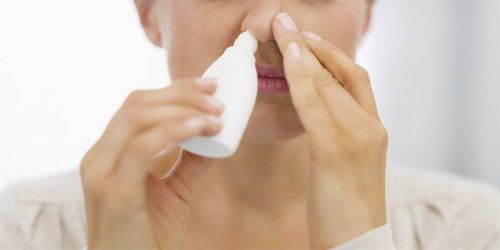
Dùng nước muối sinh lý xịt mũi cải thiện tình trạng chảy nước mắt mũi
Rinse your nose with a neti bottle Same as in the above method, but if you don't have a spray bottle you can use a neti bottle. This bottle is specially designed to help you get the mucus out. In addition, other designs include squeeze bottles or pressurized boxes instead of neti bottles
Eating spicy Capsaicin in spicy foods can help relieve a runny nose that is not caused by an allergy. When you first start using spicy food, you may not get relief immediately, but in the long run, the heat from spicy food will reduce your runny nose.
Using the right over-the-counter cold medicine
Over-the-counter cold or flu medicine can relieve symptoms of a runny or stuffy nose.
Vinmec International General Hospital examines and treats common ear, nose and throat diseases, head and neck tumors, congenital malformations of the ear, nose and throat area with the most optimal internal and surgical methods for patients, both children and adults. Coming to Vinmec, patients will receive a direct, dedicated and professional examination from a team of qualified and experienced medical staff.
Please dial HOTLINE for more information or register for an appointment HERE. Download MyVinmec app to make appointments faster and to manage your bookings easily.
References: clevelandclinic.org, medicalnewstoday.com, webmd.com



